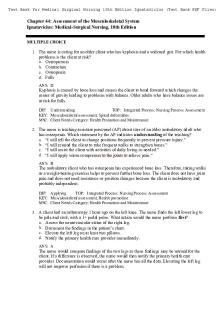Module 44 - Lecture notes 44 PDF

| Title | Module 44 - Lecture notes 44 |
|---|---|
| Author | Sarah Joy Slater-Smith |
| Course | General Psychology |
| Institution | Olympic College |
| Pages | 3 |
| File Size | 46.8 KB |
| File Type | |
| Total Downloads | 112 |
| Total Views | 190 |
Summary
Module 44 In-Class Lecture Notes...
Description
Psych 100 FALL QUARTER ‘16 Module 44: ● Schizophrenia- Psych disorder with delusions, hallucinations, disorganized speech, and/or diminished, inappropriate emotional expression ● Split mind in german ● Chief example of a psychotic disorder ● “Word Salad” ● A supportive environment and socialization helps, and 1 in 7 people can make a complete and enduring recovery ● Hallucinations- Sensing things that are only present in the mind ● Positive- Presence of inappropriate behaviour, Negative- Absence of appropriate behaviour ● Flat Affect- Emotionless, a state of no apparent feeling ● Impaired theory of mind- difficulty reading others facial emotions and states of mind ● Motor behaviour ● Chronic Schizophrenia (Process S.)- Comes on in early adulthood and tend to last longer as you age ● Acute (reactive) Can begin at any age and comes from a stressful event ● Dopamine overactivity ● 1 in 100, or with a family member its 1 in 10 ● DID (Formerly Multiple Personality Disorder)- Two or more distinct and alternating personalities ● Personality DIsorders- behaviour patterns that can’t be changed which impairs social functioning
1
● Antisocial Personality Disorder- lacks conscience for wrongdoing, even towards loved ones. Very smart. ● Anorexia Nervosa- Starvation diet despite being thing ● Bulimia Nervosa- Alternates between binge eating with purging ● Binge-Eating Disorder- Binge-eating followed by guilt minus the purging ● ^Social media and cultural ideals massively affect eating disorders Module 45: ● Biomedical Therapies & Preventing Psych Disorders ● Biomedical therapy- Changing the brain’s functioning by altering its chemistry with drugs ● Affecting circuitry with magnetic impulses ● Primary Care Providers- provide most of the drugs ● Psychopharmacology- Study of drug effects on mind and behaviour ● Anti-anxiety drugs- used to control anxiety and agitation ● Antidepressant Drugs- used to treat depression, anxiety disorders, ocd and ptsd ● Mood-stabilizing drugs- depakote, lithium helps with bipolar and epilepsy ● Electroconvulsive Therapy (ECT)- Shocking brain to manipulate it and disrupts memories ● Magnetic Stimulation- Deep brain stimulation ● Deep Brain Stimulation - with the implant ● Psychosurgery- cutting away tissue ● Lobotomy- Cutting the nerves connected to the frontal lobes ● Excersizing and being positive helps as well as focusing on good things rather than the negatives ● Social connection
2
3...
Similar Free PDFs

Module 44 - Lecture notes 44
- 3 Pages

GRE Plan - Lecture notes 44
- 3 Pages

Chapter 44 notes
- 5 Pages

Page 44
- 1 Pages

Assignment 44
- 1 Pages

Bitcoin - Apuntes 44
- 46 Pages

Lab Exercise 44
- 2 Pages

Quizlet Chapter 44
- 2 Pages

Chapter 44 - Practice questions
- 14 Pages

44 gatti CANZONE ZECCHINO
- 1 Pages

Ch 44 - Test bank
- 18 Pages

Section 44 Research Essay
- 10 Pages

TEMA 44 - romano
- 8 Pages
Popular Institutions
- Tinajero National High School - Annex
- Politeknik Caltex Riau
- Yokohama City University
- SGT University
- University of Al-Qadisiyah
- Divine Word College of Vigan
- Techniek College Rotterdam
- Universidade de Santiago
- Universiti Teknologi MARA Cawangan Johor Kampus Pasir Gudang
- Poltekkes Kemenkes Yogyakarta
- Baguio City National High School
- Colegio san marcos
- preparatoria uno
- Centro de Bachillerato Tecnológico Industrial y de Servicios No. 107
- Dalian Maritime University
- Quang Trung Secondary School
- Colegio Tecnológico en Informática
- Corporación Regional de Educación Superior
- Grupo CEDVA
- Dar Al Uloom University
- Centro de Estudios Preuniversitarios de la Universidad Nacional de Ingeniería
- 上智大学
- Aakash International School, Nuna Majara
- San Felipe Neri Catholic School
- Kang Chiao International School - New Taipei City
- Misamis Occidental National High School
- Institución Educativa Escuela Normal Juan Ladrilleros
- Kolehiyo ng Pantukan
- Batanes State College
- Instituto Continental
- Sekolah Menengah Kejuruan Kesehatan Kaltara (Tarakan)
- Colegio de La Inmaculada Concepcion - Cebu


